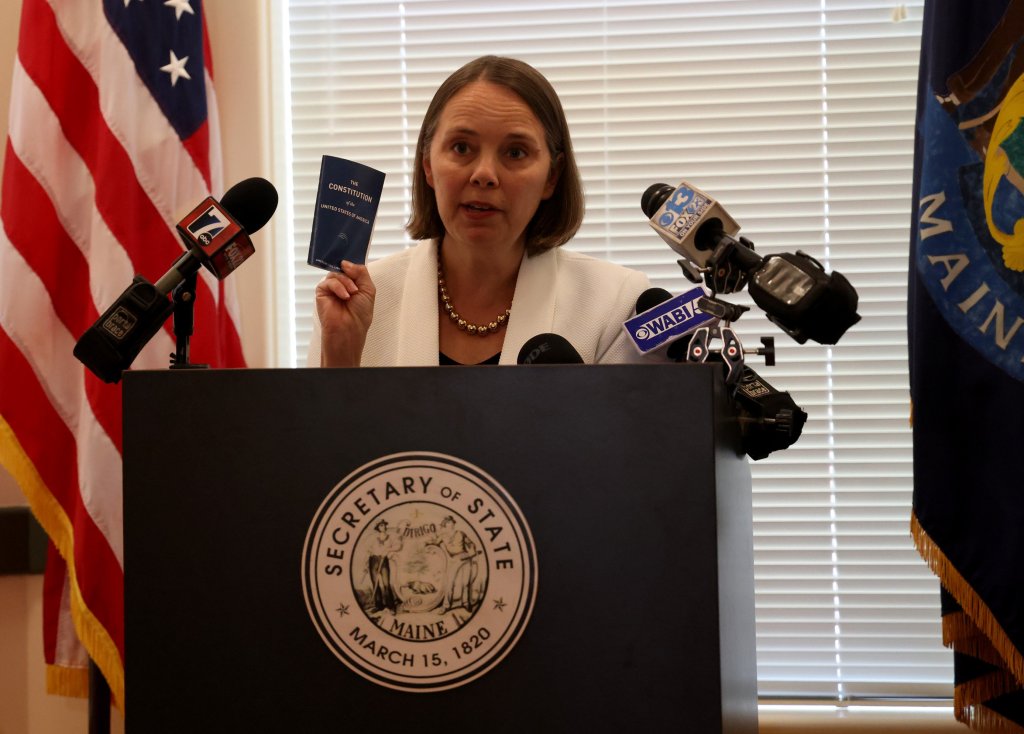
Maine has again denied a request from the U.S. Department of Justice to provide the personal information of the state’s more than 1 million registered voters, including names, birth dates and partial Social Security numbers.
The Trump administration has asked all 50 states to turn over the sensitive data, which also includes voters’ driver’s license numbers and home addresses, as well as information about election officials and voter registration applications.
Secretary of State Shenna Bellows announced that she intended to deny the initial request in a July news conference — telling the DOJ to “go jump in the Gulf of Maine” — and formally declined in a letter on Aug. 8.
In a letter dated Aug. 18 responding to Bellows’ initial denial, U.S. Assistant Attorney General Harmeet Dhillon requested the information again.
On Monday, Bellows, who is also a Democratic candidate for governor, said in response to the second request that she continues “to have grave concerns about the appropriateness and legality of DOJ’s request.”
“The Department of Justice hasn’t shown any good reason for its fishing expedition for sensitive voter information on every American,” Bellows said in a written statement Monday. “The federal government has a terrible track record keeping private data safe. Their data demands appear to violate federal privacy laws and complying would put the privacy and data security of nearly 1 million Mainers at risk.”
In addition to voter registration information, the DOJ also requested the names of local election officials and any Maine voter registration applications submitted between Dec. 1, 2023, and July 1 of this year.
The DOJ said in its initial letter in July that Maine had roughly 11,000 voters with duplicate registrations, and that the purpose of its request was to ensure ineligible voters are removed.
The Maine Republican Party previously claimed widespread voter fraud across the state, but a subsequent investigation by Bellows’ office in July found those claims were baseless.
In a written statement Monday, House Minority Leader Billy Bob Faulkingham, R-Winter Harbor, criticized Bellows for rejecting the request, saying that she is refusing to address “serious concerns about election integrity” and choosing “partisanship over leadership.”
Bellows has cited the federal Privacy Act of 1974, which requires an individual’s consent for their personal information to be disclosed, as one reason she would not abide by the request.
“All data received from you will be kept securely and treated consistently with the Privacy Act,” Dhillon, the assistant attorney general, wrote in her renewed request. “Maine’s privacy laws, to the extent they are inconsistent with federal law, are preempted.”
Bellows has also argued that the First Amendment puts states in charge of federal elections, and therefore, “the DOJ doesn’t get to know everything about you just because they want to.” Her letter Monday referenced a slew of other state and federal laws that she believes prohibit her from providing the requested information.
“If DOJ is willing to provide additional information addressing my concerns above, I will carefully consider that information,” Bellows’ letter on Monday concludes. “At this time, however, I am unable to comply with the DOJ’s requests for unredacted information concerning all Maine voters.”
While all six states in New England have been contacted by the DOJ regarding turning over their voter data, none has complied yet, according to the Brennan Center for Justice, a left-leaning public policy institute that is tracking the requests.
Similar to Maine, New Hampshire denied the DOJ’s initial request, received a second letter on Aug. 18 and subsequently denied that request, too.
In Vermont, Secretary of State Sarah Copeland Hanzas said in an Aug. 13 news release that “our office has no plans to share Vermont voter data with the federal government.”
Some states, such as Florida and Michigan, consented to the DOJ’s request without a fight, according to the Brennan Center’s tracker, while other states, such as South Carolina, have entertained the prospect by meeting with DOJ officials. However, a South Carolina voter recently sued the state’s election commission over the matter, and last week, a judge temporarily blocked action on the request until a hearing scheduled for Wednesday takes place.

We invite you to add your comments. We encourage a thoughtful exchange of ideas and information on this website. By joining the conversation, you are agreeing to our commenting policy and terms of use. More information is found on our FAQs. You can modify your screen name here.
Comments are managed by our staff during regular business hours Monday through Friday as well as limited hours on Saturday and Sunday. Comments held for moderation outside of those hours may take longer to approve.
Join the Conversation
Please sign into your CentralMaine.com account to participate in conversations below. If you do not have an account, you can register or subscribe. Questions? Please see our FAQs.